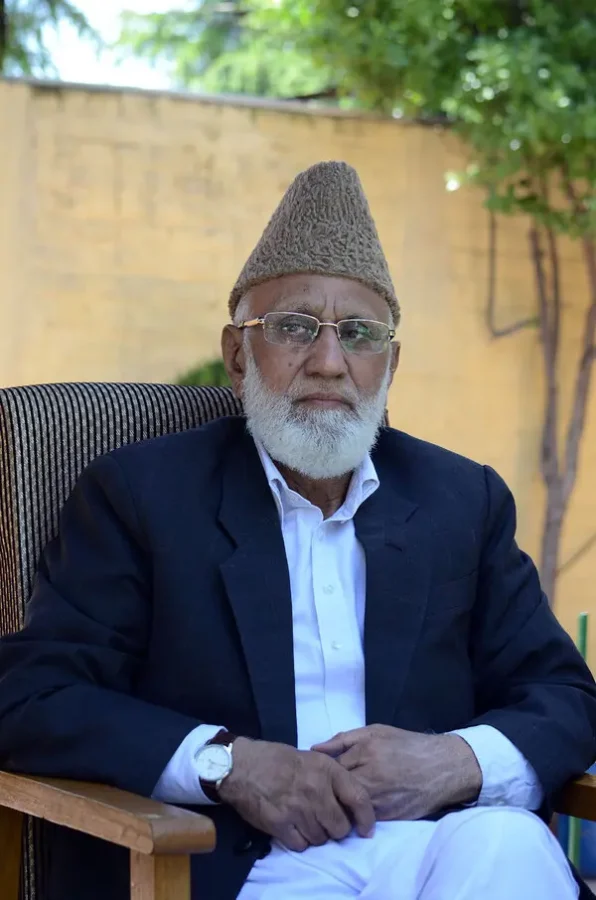Zaain ul Aabideen
Muhammad Ashraf Khan, fondly known as Ashraf Sehrai, breathed his last in the custody of oppressors on 5th May 2021 and thus left behind a legacy written with golden words in Kashmir’s struggle for freedom. A year before in May 2020, his son Junaid Ashraf Sehrai was martyred in Kashmir’s summer capital Srinagar. Ashraf Sehrai’s life and journey exemplifies the commitment of Kashmiris to their cause. Sehrai was born in a landlord family in Tekipora Lolab, north of Valley’s beautiful Kupwara district bordering Pakistan. His ancestors had migrated from the Swat region of Pakistan before the partition of the subcontinent. In the late 1980s, as Kashmir simmered with the imminent eruption of resistance against Indian rule, a team from the Intelligence Bureau (IB) made their way to Sehrai’s humble abode in Tekipora village of the Lolab Valley. After partaking in the customary salt tea, they broached the subject of unloading heavy bags from their truck, purportedly a gift for Sehrai. When questioned about their contents, they revealed that these bags were laden with money, intended as a “gift” to dissuade Sehrai from aligning with the burgeoning Kashmiri movement. With a smile on his face, Sehrai calmly rebuffed their offer, stating, “Sehrai cannot be purchased with money no matter how much it is!” This steadfast character defined Sehrai throughout his life and his people often referred to him as the man with an uncompromising nature.
His association with the Islamist movement burgeoned in the early 1950s, as he found a home in the ranks of Jama’at-e-Islami (JeI) Jammu and Kashmir. Swiftly rising through the ranks of JeI, Sehrai’s dedication and profound understanding of Islamic teachings earned him the monikers of “Man of the Book” and “The Crisis Manager.” Sehrai’s resolve never diminished, even as his family bore the brunt of his association with Kashmir’s war of liberation. His son, Junaid, joined the ranks of the Hizbul Mujahideen and embraced martyrdom as district commander in Srinagar in 2020. Yet, Sehrai remained resolute and never showed any signs of fatigue until he breathed his last in Jail.
Sehrai, together with the venerable Qaid-e-Inqilaab Syed Ali Geelani, forged Tehreek-e-Hurriyat (TeH), a Resistance organization providing direction to the oppressed masses of the occupied territory. Rooted in the principles of Islam, Azaadi, and Itehaad, TeH resonated with the aspirations of a nation yearning for the liberation of the region. Amidst crackdowns and incarcerations, Sehrai’s steadfast leadership propelled TeH to the forefront of the resistance movement. His astute guidance laid the foundations for mass civil uprisings and challenged the hegemony of the Indian state.
The bond between Geelani and Sehrai transcended the realms of politics and encompassed a lifetime of shared struggles and sacrifices. Both of these resistance leaders with unshakable faith remained steadfast under searing circumstances where the Indian military was killing people at will.
Sehrai faced the ire of his oppressors throughout his life. Detained under the draconian Public Safety Act (PSA), he languished in the confines of Udhampur jail where his health deteriorated with each passing day. Denied access to medication and deprived of the solace of reading the Holy Qur’an, Sehrai’s last days were a testament to the cruelty of the Indian state.
On his martyrdom anniversary, we mourn the loss of a visionary leader and a steadfast champion of freedom. Yet, amidst our grief, we take solace in the legacy he leaves behind—a legacy of courage, resilience, and unwavering defiance. Our tormentors may have succeeded in silencing Muhammad Ashraf Sehrai, but his spirit lives on in the hearts of every Kashmiri who dares to dream of a free and prosperous tomorrow. He continues to inspire us.
In his memory, we renew our pledge to carry forward the torch of resistance, until the everlasting dawn of freedom illuminates the skies of Kashmir and we get rid of the foreign Indian occupation.










